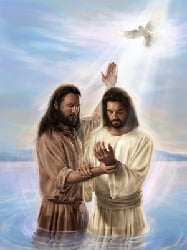09: The Church: Rites and Rituals – Thought Starters
[Thought questions for The Church: Rites and Rituals November 28, 2012]
1. Baptism. How vivid is the memory of your baptism? Did you feel triumphant? courageous? curious? scared? What about the week after your baptism? Had the feelings faded? Did you ever leave the church or become lax in observing key teachings of your church? If so, do memories of your “wandering” experience linger with you today? Do they return to you whenever you observe a baptism? Is baptism a requirement for salvation? Why? or why not? When you plunge beneath the waters during baptism, what does this immersion represent? Why do you think so few churches follow the tradition of baptism of the New Testament and resort to “sprinkling” or other symbolic measures of immersion in Christ?
2. The joys of baptism. What do you like about the Seventh-day Adventist’s church’s concept of baptism being withheld from children? What about the total immersion doctrine? Is there a strong Scriptural basis for our church’s beliefs about baptism? If so, why is it so hard to discuss them with an interested friend? If baptism is a sacrament, why wouldn’t it matter what the age of the person being baptized might be? What is the difference between considering baptism as a sacrament or as an ordinance? What is the biggest requirement for being baptized? What does the person who wants to be baptism need more than anything else?
3. Ordinance of humility. Which brings the greatest blessing, to serve or to be served? Why? Has it always been this way? What should be our attitude toward God when we kneel or bow our heads or turn our mind to Him in prayer? Was the Upper Room experience the first time Jesus had humbly served others? If you said, “No,” then why were his disciples so surprised? Why hadn’t they caught on by then? Some church members choose not to participate in the foot washing aspects of the communion service. Can you or I do anything to make others feel welcome at this service? What about the practice by elders and deacons to take the service to shut-ins who can’t make it to church? Should we support such endeavors?
4. The Lord’s Supper. In what way is the Lord’s Supper a reminder of the Israelites’ plight and final rescue from slavery? Do you sense a deep fellowship with members of your church and concern for your family members when you eat the bread and drink the wine offered at Communion? Or does the whole service just seem like an empty routine? How can we keep these simple routines from losing their sense of anticipation and joy as well as humility and self-sacrifice? In what ways is the Communion service linked to the Second coming of Jesus?
5. Anticipating Jesus’ Coming. Why should we continue to observe the ordinances of the Communion service until Jesus comes? Is the Communion service linked to the Second Advent? How? If Jesus “did it all” on the cross when He gave His life for you and me, what is left to be accomplished in the Second Coming? What about very large churches where it is inconvenient to provide foot-washing space and tools? Or very small churches that don’t have access to the beautiful pitchers and glasses other churches enjoy for this ceremony? Imagine being invited by Jesus to enjoy fellowship together as we drink the juice of the vine in heaven. Can we be sure this will be our privilege? How?


In anticipating the second coming, we’ve all had moments of doubt and pain; thinking that Jesus doesn’t care anymore or that it’s all just a big lie and that God really doesn’t exist. I’ve prayed for Jesus to come many times, but I always end up eating that prayer as I meet more people who want to know the truth in Christ Jesus. We get so caught up in our own little world and our own suffering that we forget there are many around us who are suffering 10 times worse because they do not know God or have a saving relationship with Jesus Christ.
If we would hasten the 2nd coming of Christ, we must do a work that will rattle the devil’s cage and bring about fearsome persecution. That’s how we’ll truly know He is coming soon.
The Ordinance of Foot Washing is a unique ordinance. Living in a culture and age when many regard humility as a sign of weakness, it always gives me joy to see proud gallant men and women stoop down on their knees to wash each other’s feet. As Christians we need a daily reminder that it is not our educational status with all it’s accolades; it is not our high position in the church with the recognition that accompanies it; it is certainly not our economic status that matters when dealing with our salvation, but it is a close personal relationship with our Lord and Savior Jesus Christ that leads us to salvation, and extreme humility is the hallmark of our Savior.